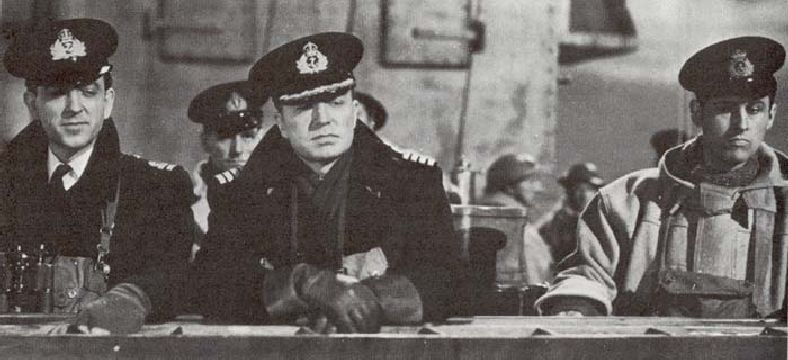Convoy (1940) 
“A Blasting Salvo Of Giant Action And Thrills!”

Director: Penrose Tennyson
Cast: Clive Brook, John Clements, Edward Chapman
Synopsis: A tale of the highs and lows of life protecting the vital convoys between America & England during WWII.
WARNING – This review contains SPOILERS!
The outbreak of war in Europe triggered a whole sub-genre in cinema — the propaganda (or patriotic, depending on your viewpoint) war movie. Many of these movies followed a well-worn path of introducing its audience to a group of characters (from upper and lower ranks) either as they underwent basic training or as they impatiently waited for a taste of action, and then showed us their heroism in the heat of battle. They rarely featured cowards or malingerers, moaners or traitors, just a bunch of decent, ordinary men prepared to go to extraordinary lengths in the service of their country. Some of these movies were better than others, with Convoy belonging amongst the more proficient of the titles while still failing to shed that air of generic manufacture.
Convoy follows the exploits of the crew of the cruiser Apollo which, as the story begins, is hoping for a spell of leave following a gruelling tour of duty. Their hopes are dashed, however, when their Captain, Tom Armitage (Clive Brook — Shanghai Express) receives orders to escort a flotilla of merchant ships crossing the ocean from Poland. Armitage is as unhappy about it as his men, but his dissatisfaction is deepened when he learns of the new addition to his crew — Lieutenant Cranford (John Clements — Things to Come, The Four Feathers), the man who stole Armitage’s wife Lucy (Judy Campbell) away from him and then apparently dumped her not long after. Needless to say, the relationship between Armitage and Cranford is just a tad frosty — and grows even more strained when, in the kind of coincidence that occurs only in the movies (and usually in far worse ones than this), Lucy just happens to be on board a boat carrying Jewish refugees (at £20-per-head).
Convoy isn’t all about the romantic complications of the ruling class, however, because below decks the ship is filled with cheery Cockneys with ‘Cor, blimey’ accents (and nah mistake!) happily going about their business of winning the war. It’s strange how the lower ranks always seem to be comprised entirely of a small group of men born in a tiny area of London, but if that’s how it’s shown in a British wartime movie then that’s how it must have been. Joking aside, the working class aren’t the only ones to be stereotyped: the British officers are all terribly civilised, while their German counterparts are all rakish cads who don’t have time to pluck civilian victims of their attacks from the cold waters of the sea. ‘Us Germans think only as our Fuhrer has told us!’ proudly declares one captured officer.
The personal conflicts that are introduced early on in Convoy are given only passing attention and are unsatisfactorily resolved — it turns out that Lucy dumped Cranford and not the other way around which, for some reason, allows Armitage to forgive him completely for running off with his wife in the first place! It’s a shame because, had this aspect of the story been given a more involved and adult treatment it would have enhanced an already decent movie even further. The cast features a number of familiar names in small roles – Michael Wilding, Anton Diffring, Stewart Granger and John Laurie all make brief appearances – and features a well-staged sea battle which is marred only by some obvious model work.
(Reviewed 18th April 2014)
